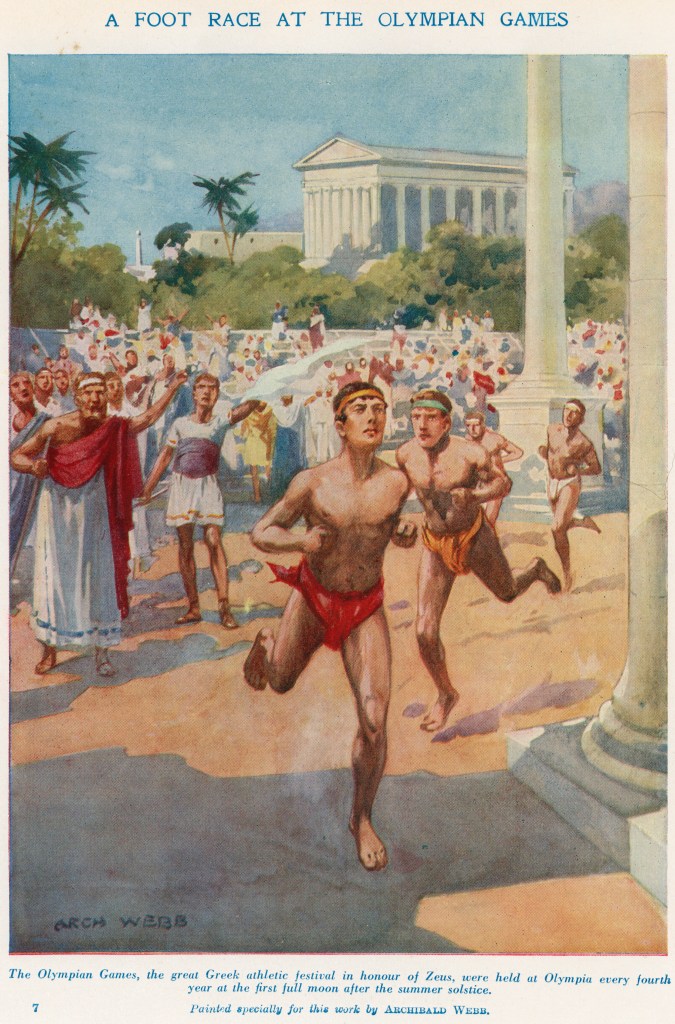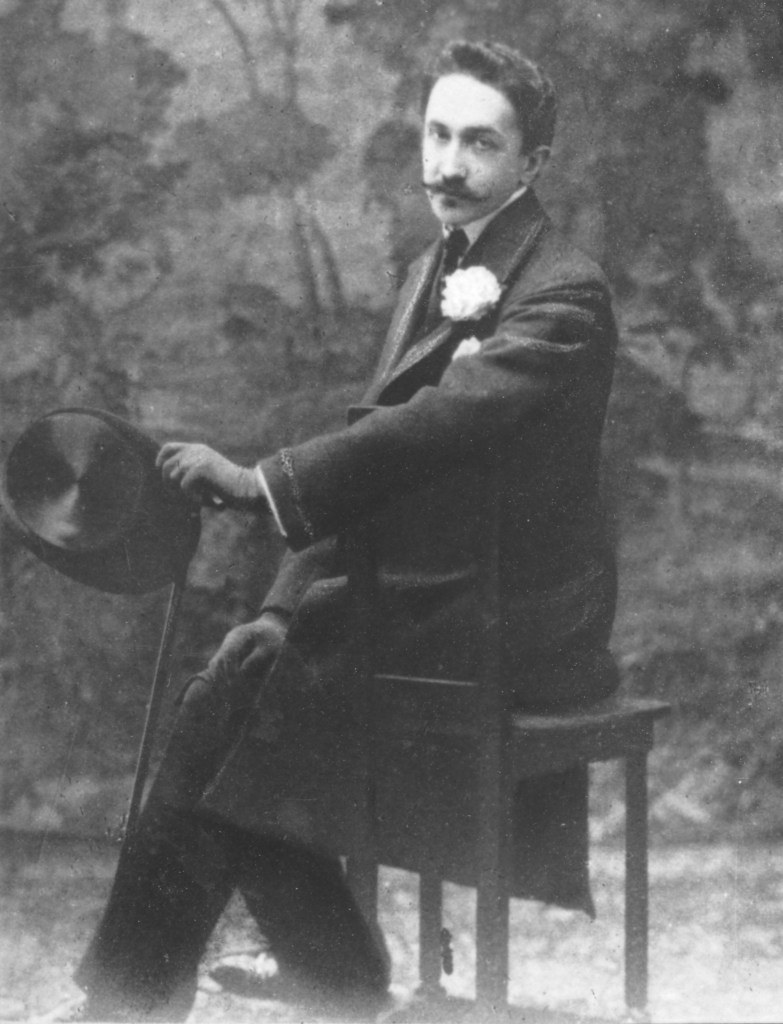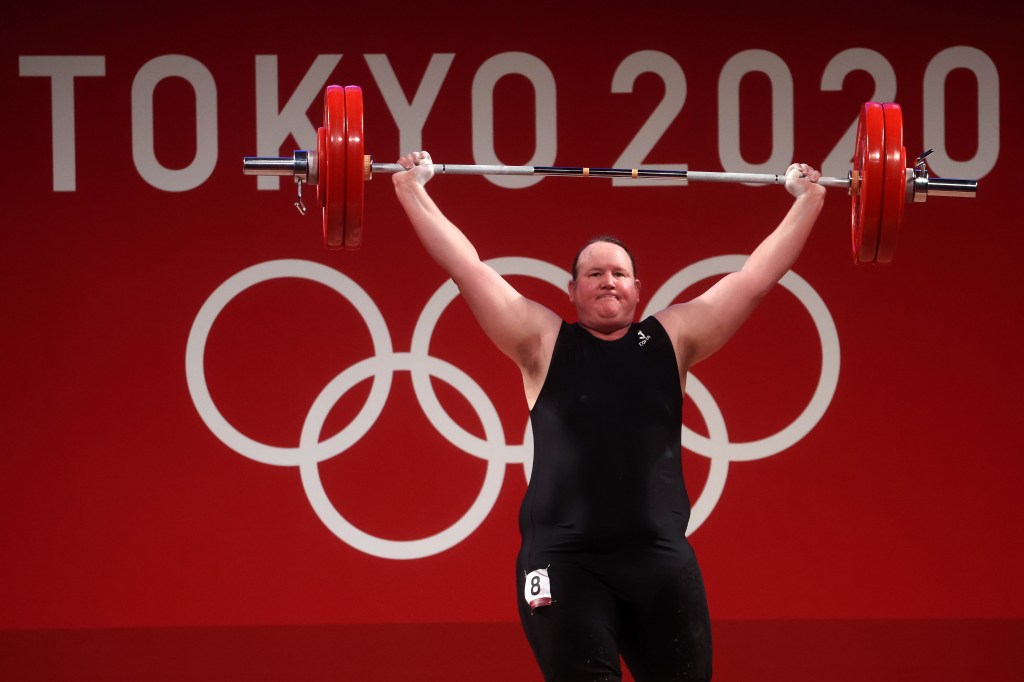A queer history of the Olympic Games: from naked ancient Greek wrestling to Tom Daley

The Olympics have been queer since the very beginning (Getty/DeviantArt/Creative Commons)
With this year’s Olympic Games in Paris about to start, we’re taking the opportunity to reflect on the queer history that underscores the modern event.
The ancient Games was pretty much made up of muscular, oiled-up, naked ancient Greek men wrestling, and, although things might have changed somewhat (bring back naked, oiled-up wrestling, you cowards!) more than 320 LGBTQ+ athletes have since won medals.
In short, the Olympics is undeniably a place where the sports world meets the queer community. But how did it all start? Let’s find out.
When was the first Olympic Games?

The history of the Olympic Games goes back around 3,000 years (about 776BC), to the Peloponnese in Ancient Greece.
Every four years, about 50,000 people would witness the ancient games – a religious festival held in honour of Zeus, the king of the gods.
At the time, homosexuality wasn’t a defined concept. However, it is understood by historians that most men would have taken part in homosexual activity during that period. Evidence of this activity exists with images on ancient pottery depicting athletes in unabashedly queer positions – always men and often naked. The oily, eroticised male form shows the Games were laden with homoeroticism.
According to The Closet Professor, to “protect their penis during wrestling matches and other contact sports” athletes would tie their appendage to their bodies, making them look constantly erect.
Furthermore, poet Theognis of Megara detailed the events that occurred after the games: “Happy is the lover who, after spending time in the gymnasium, goes home to sleep all day long with a beautiful, young man.”
Greek and Roman history expert David Stone Potter has backed this description and said some gymnasiums had to ban some men who went there purely to pick up other guys.
Who was the first LGBTQ+ Olympian?

The first known Olympic athlete to be gay was French equestrian Robert de Montesquiou, or, to give him his full title, Marie Joseph Robert Anatole, comte de Montesquiou-Fézensac. He won a bronze medal at the Hacks and Hunter combined event, as part of the 1900 summer Olympics.
In 1894, Baron Pierre de Coubertin founded the International Olympic Committee which led to the first modern Games in Athens two years later.
Robert Dover was the first publicly out athlete to compete in the modern era. Like Montesquiou, he was an equestrian.
Dover first competed at the summer Olympics in Los Angeles in 1984, at the age of 28. He finished 17th individually, and his US team came 6th.
Ahead of the 1988 Seoul Olympics (where he finished 13th, and the team tied for 6th place), Dover came out as gay. It was a time when the Aids epidemic was devastating the LGBTQ+ community.
Reflecting on his coming out, Dover told the OutSports podcast that his line was: “My name’s Robert Dover, I’m the token Jewish gay boy on the US Olympic team, in the equestrian sport of dressage.”
He went on to say: “People laughed, but I had a lot of press following me around. And the same with 92 and 96 [Games]. I had a lot of press because… I was somebody who wasn’t afraid to talk about being openly gay in Olympic sport.”
Dover went on to compete in six Olympics, winning four medals. His career lasted until the late 1990s when an injury caused major back pain which prevented him from riding competitively.
With his partner, fellow rider Robert Ross, Dover established the Equestrian Aid Foundation to help provide emergency financial grants to members of the US equestrian community struggling to overcome catastrophic illness, injury, or other unforeseen crises.
Who is the most decorated LGBTQ+ Olympian?
The most decorated LGBTQ+ Olympian is Lee Pearson, a British paralympic equestrian. He won 17 medals, including 14 golds.
Throughout his career, Pearson won 30 gold medals at European, world and paralympic levels.

The most decorated able-bodied LGBTQ+ Olympian is Dutch speed skater Ireen Wüst, with 13 medals – six of which are gold.
A total of 149 LGBTQ+ athletes have won gold medals.

Have LGBTQ+ athletes always been able to compete at the Olympic Games?
Yes, as we can see above, LGBTQ+ athletes have always been a part of the Olympics. However, they have become increasingly visible in modern times, from diver Tom Daley and skier Gus Kenworthy to basketball star Brittney Griner.
In fact, queer athletes were in the spotlight at the 2020 summer Olympics, delayed by the pandemic and held in Tokyo the following year.
The Games were nicknamed the Rainbow Olympics thanks to the rise in the number of openly LGBTQ+ athletes.
OutSports reported that they were able to name 185 publicly out athletes by the end of the sporting celebration, more than all previous summer and winter Games combined.

This wasn’t the only LGBTQ+ history made in Tokyo. New Zealand weightlifter Laurel Hubbard became the first openly transgender woman to compete.
“I am grateful and humbled by the kindness and support that has been given to me by so many New Zealanders,” she said following her selection.
Transgender athletes have been allowed to compete at the Olympics since 2004. However, the increasingly demanding requirements placed on them are putting up significant barriers.
Do athletes have sex at the Olympics?
There have pretty much always been rumours about athletes turning into rabbits during the high-stress, adrenaline-fuelled experience of the Olympics.
From sex bans to cardboard anti-sex beds (as tested above by Tom Daley), the topic of sex at the Olympic Games is the talk of the athletes’ village.
This year, Olympic bosses are making 300,000 condoms available to athletes. This comes after a sex and intimacy bans and social-distancing rules were put in place during the pandemic.
Condoms have been accessible to competing athletes since the Seoul Games in 1988. The record, however, was at the 2016 Olympics in Rio where 450,000 were reportedly handed out.
Ahead of athletes arriving at the Games, rumours about anti-sex beds are once again circulating.
These cardboard beds are said to collapse under the pressure of two (or more) people, but as Tom Daley points out above, they seem pretty sturdy.
In 2021, Irish gymnast Rhys McClenaghan also videoed himself jumping on the bed – which did not collapse.
With the summer Games running from 26 July to 11 August, it’s worth remembering – despite our quirky look back at the event’s past – this is a time where sport is supposed to be under the spotlight. The gender or sexuality of an athlete shouldn’t be the main topic of discussion.
How did this story make you feel?

